Introduction
In the competitive landscape of family law, practitioners must leverage innovative marketing strategies to stand out and attract clients. A comprehensive approach to content marketing, social media engagement, and search engine optimization (SEO) can significantly enhance a lawyer’s visibility and credibility.
By addressing common legal challenges through informative content and establishing a robust online presence, family lawyers can not only connect with potential clients but also build trust within their communities.
This article delves into effective strategies that family lawyers can adopt to optimize their marketing efforts, strengthen their personal brand, and cultivate valuable referral networks, ultimately driving growth and success in their practices.
Harnessing the Power of Content Marketing for Family Lawyers
Family attorneys can substantially enhance their practice by adopting a comprehensive family lawyer marketing strategy. This involves crafting informative blog posts, articles, and guides that tackle prevalent legal challenges faced by families. For example, topics such as:
- ‘Understanding Child Custody Laws’
- ‘Steps to Take When Filing for Divorce’
not only offer valuable insights but also establish the professional’s expertise in the field.
Research indicates that 70.7% of attorneys respond to potential leads within an hour, making timely and relevant content essential for capturing interest. Furthermore, it’s significant that 75% of attorneys allocate under 10 percent of their budget for social media, emphasizing a potential area for improvement in their promotional efforts. Incorporating video content can enhance engagement, fostering a more personal connection with prospective customers.
Additionally, trends indicate that:
- 40% of respondents are interested in incorporating visual search into their promotional approaches
- 37% are exploring voice search
- 32% intend to improve localized SEO techniques
Regularly updating content and optimizing it for pertinent keywords is crucial, as effective technical SEO practices can lead to improved search rankings and increased web traffic. For example, a case study on technical SEO shows that proper practices result in higher search rankings, increased web traffic, and ultimately more leads and customers for law firms.
In fact, law firms that prioritize family lawyer marketing strategies experience a significant rise in leads and customers, underscoring the importance of a robust content marketing approach in the legal sector.
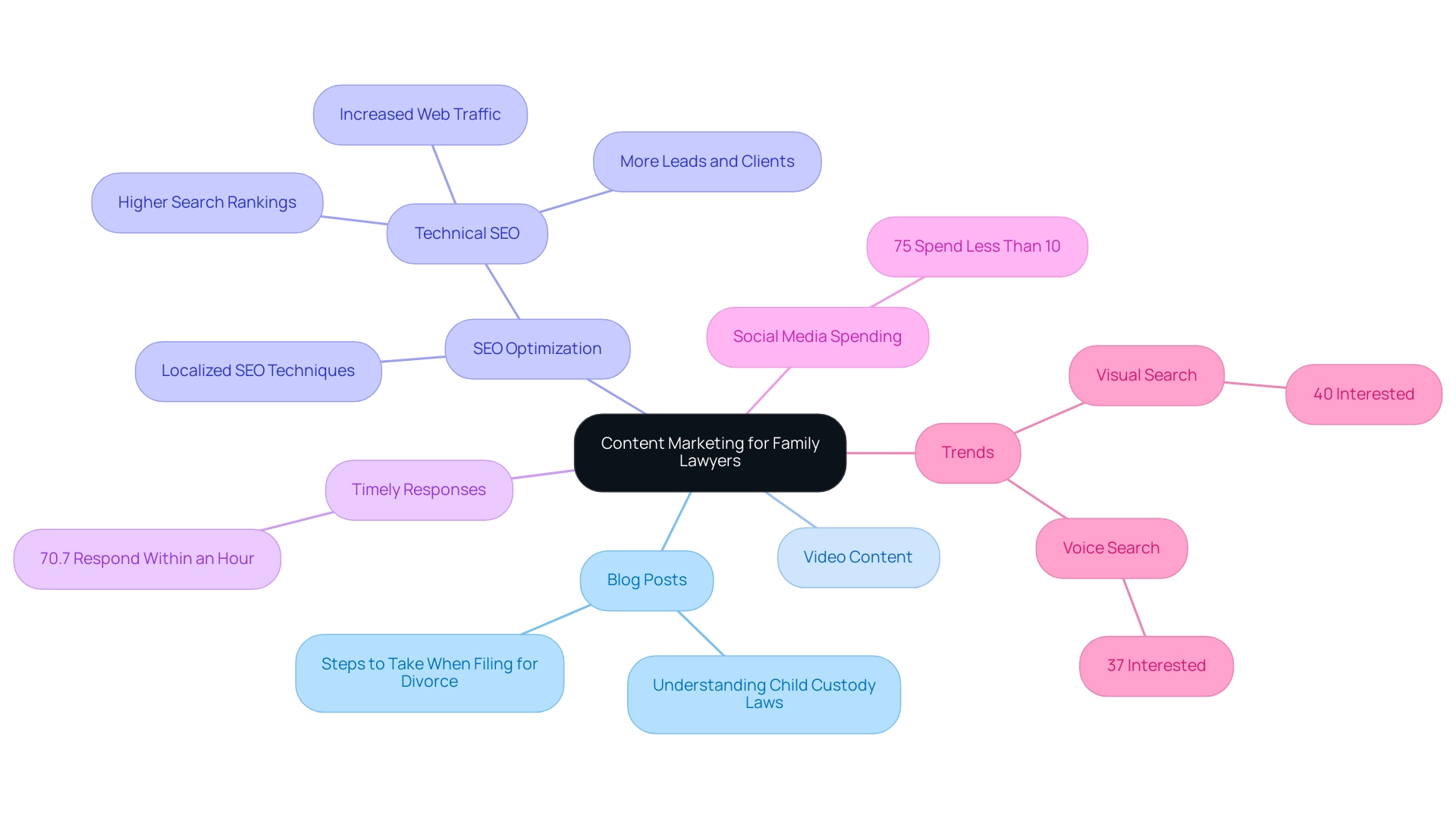
Leveraging Social Media to Connect with Clients
Family lawyers must prioritize active engagement in family lawyer marketing on social media platforms such as Facebook, LinkedIn, and Instagram to effectively connect with their target audience. By sharing informative content, testimonials, and updates about their firm, attorneys can significantly enhance their visibility and foster trust among prospective customers. Community-focused posts, including legal tips and information about local events, serve to build rapport and establish a connection with the community.
Furthermore, comprehending the target audience is essential for effective social media marketing, allowing tailored content to meet customer needs. The strategic use of targeted advertising is essential in family lawyer marketing for reaching individuals actively seeking family law services. This method not only attracts visitors to the attorney’s site but also boosts inquiries from potential customers.
Notably, a significant 70.7% of attorneys respond to potential leads within an hour, underscoring the importance of prompt engagement in capturing interest. As legal practices increasingly direct their promotional funds toward online platforms—65% prioritize digital outreach, and 75% of attorneys say they allocate less than 10 percent of their budget to social media—effective family lawyer marketing through social media approaches becomes essential for long-term success in client acquisition. The case study titled ‘Legal Marketing Budget Allocation’ illustrates this trend, showing that law firms that prioritize online marketing see positive outcomes associated with this shift.
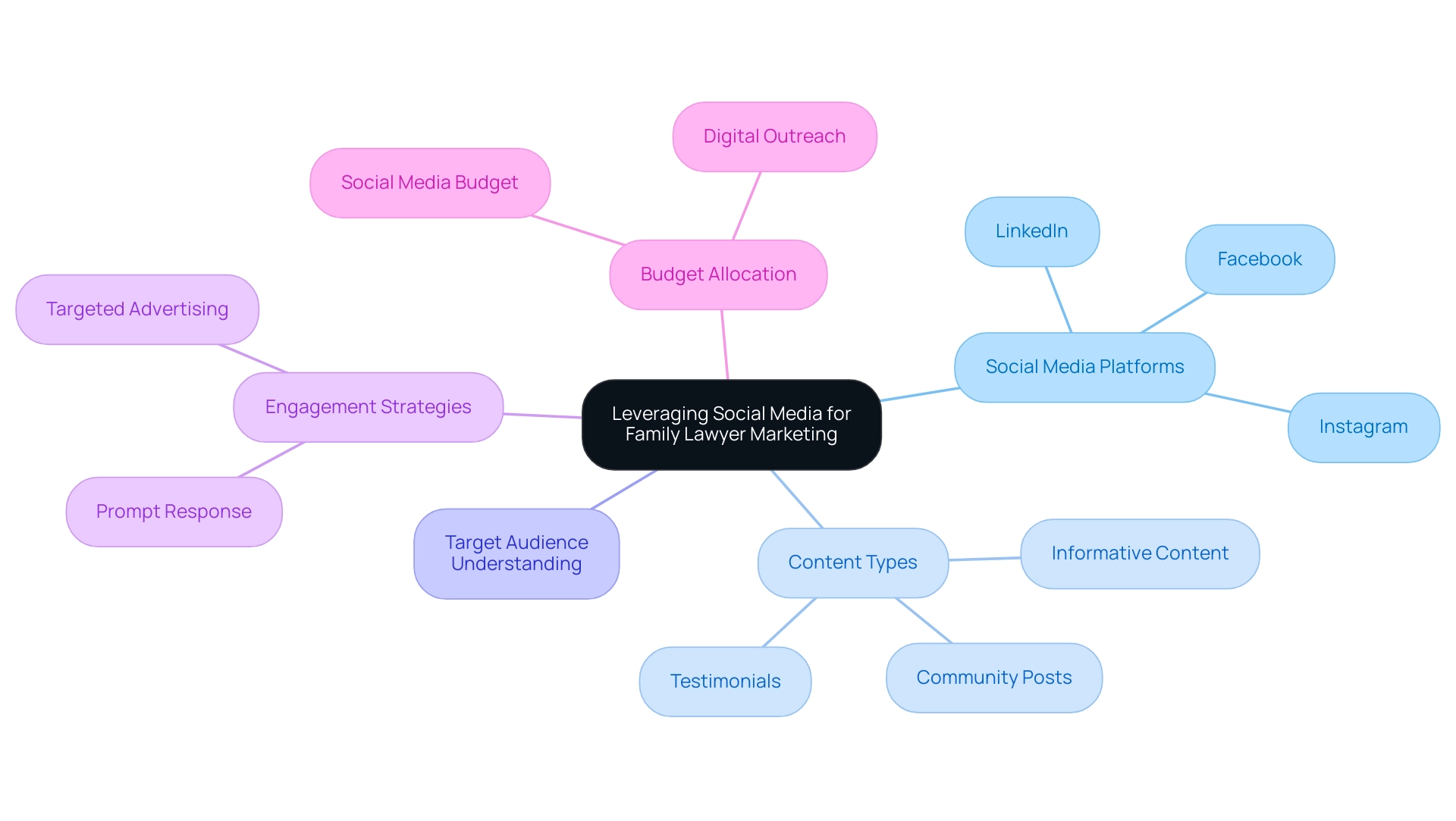
Optimizing SEO Strategies for Increased Visibility
To effectively enhance online visibility, family lawyer marketing must prioritize both on-page and off-page SEO approaches. Conducting thorough keyword research is essential to identify high-traffic terms that potential clients frequently search, such as ‘family attorney near me’ or ‘divorce specialist.’ Integrating these keywords seamlessly into website content, meta descriptions, and headings can significantly improve search engine rankings.
Additionally, building quality backlinks through guest blogging and forming partnerships with local organizations can bolster credibility and authority in the legal sector. Notably, continued investment in law firm SEO is crucial, as it may take 12 to 18 months to start seeing substantial traction from these efforts. Regularly updating the website with fresh, relevant content and ensuring mobile-friendliness are also vital components of a successful SEO strategy.
As emphasized by industry specialists:
- 75% of attorneys claim they allocate under 10 percent of their budget to social media, indicating a strategic emphasis on SEO and other digital promotional methods.
- A case study reveals that business law firms allocate only 5% of their budget to social media marketing, underscoring the trend of prioritizing SEO.
Ongoing investment in family lawyer marketing can lead to exponential growth, aligning with the latest trends in SEO for family attorneys in 2024.
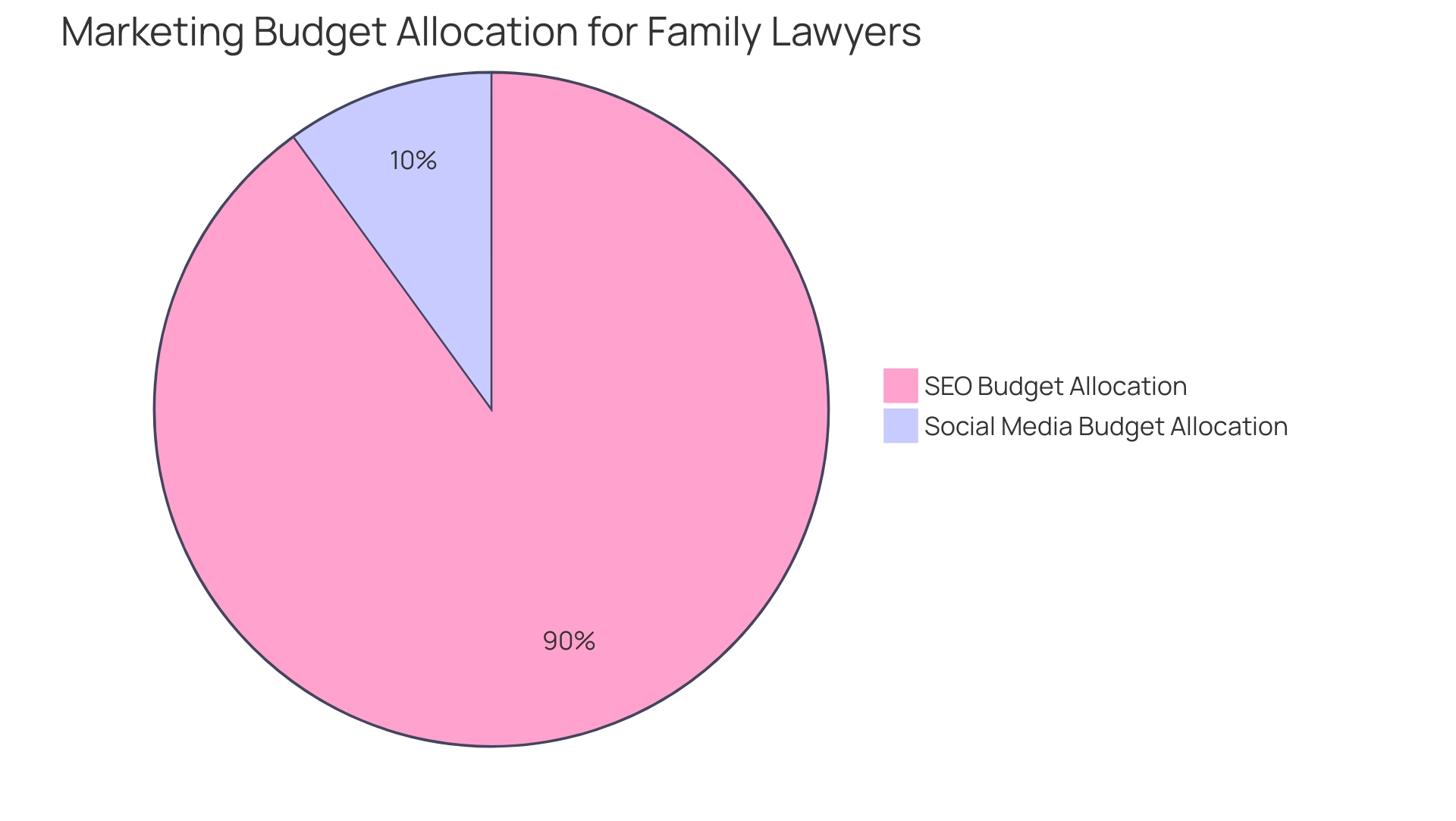
Building a Strong Personal Brand to Stand Out
Family lawyers must prioritize the development of a robust personal brand that authentically reflects their values, expertise, and distinctive practice elements. Achieving this requires a commitment to consistent messaging across various platforms, including websites, social media, and professional networking sites. By sharing personal stories and community involvement, attorneys can significantly enhance their relatability, fostering deeper connections with potential customers.
Statistical insights underscore the significance of this strategy; in 2024, effective personal branding is anticipated to be a crucial factor in trust and engagement in the legal sector. Furthermore, obtaining relevant certifications and accolades, and displaying them prominently, can enhance credibility and draw in individuals who seek knowledgeable representation. Notably, research indicates that attorneys collect on 91% of the hours they bill, highlighting that improved client relationships fostered through strong personal branding can lead to better collection rates, ultimately increasing revenue.
As highlighted by AttorneyAtWork, the current trend shows that 75% of legal professionals allocate less than 10 percent of their budget to social media, suggesting a significant opportunity for those willing to invest in this vital area. This underinvestment in social media highlights the necessity for family lawyer marketing approaches, as family attorneys position themselves effectively in a competitive market while also utilizing statistical data to anticipate and prepare for future growth.
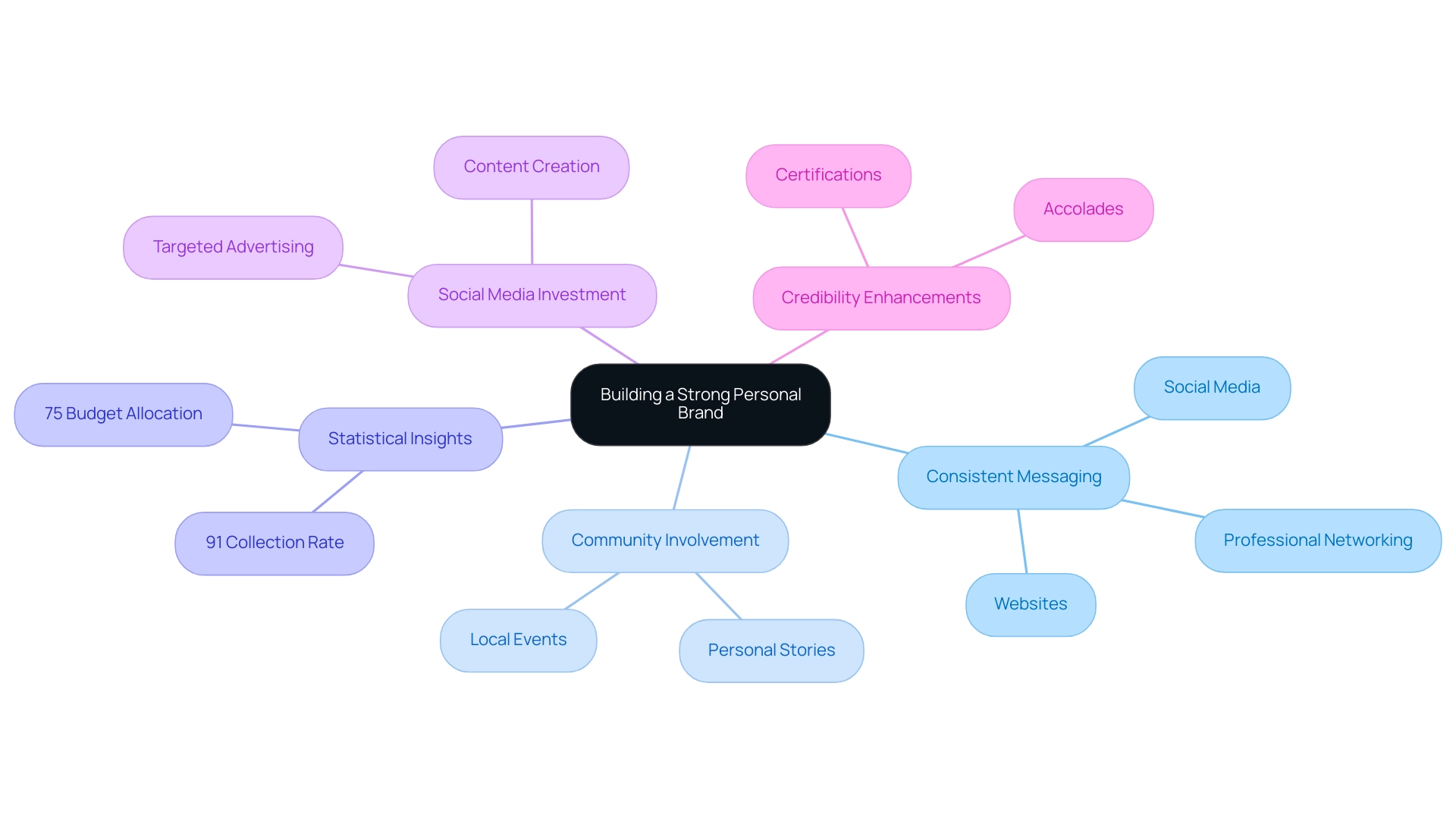
Creating Effective Referral Strategies for Client Acquisition
Family attorneys can significantly enhance their referral strategies through family lawyer marketing by cultivating robust relationships with a diverse range of professionals, including therapists, financial advisors, and fellow practitioners. Engaging in networking events, participating in community initiatives, and joining local organizations provide valuable opportunities to connect with potential referral sources. Current statistics indicate that 72% of consumers prefer a combination of digital and traditional marketing, underscoring the need for law firms to adopt a multifaceted approach to outreach.
Furthermore, a compelling statistic reveals that 81% of people research legal services online before contacting an attorney, highlighting the importance of maintaining a strong online presence. As Sasha Berson notes, 95% of legal consumers read online reviews before hiring an attorney, emphasizing the significance of a positive online reputation. Furthermore, establishing a structured referral program that provides incentives for recommendations can encourage pleased customers and colleagues to suggest a lawyer’s services.
Consistent follow-ups with these referral sources, along with expressions of gratitude for their support, can further strengthen these relationships, ultimately resulting in a dependable flow of referrals. The impact of networking on client acquisition is exemplified by Jason Javaheri’s successful partnership with a family law firm, demonstrating how collaboration can enhance referral relationships. By fostering these connections, family lawyer marketing can create a sustainable pipeline of referrals that enhances their practice.
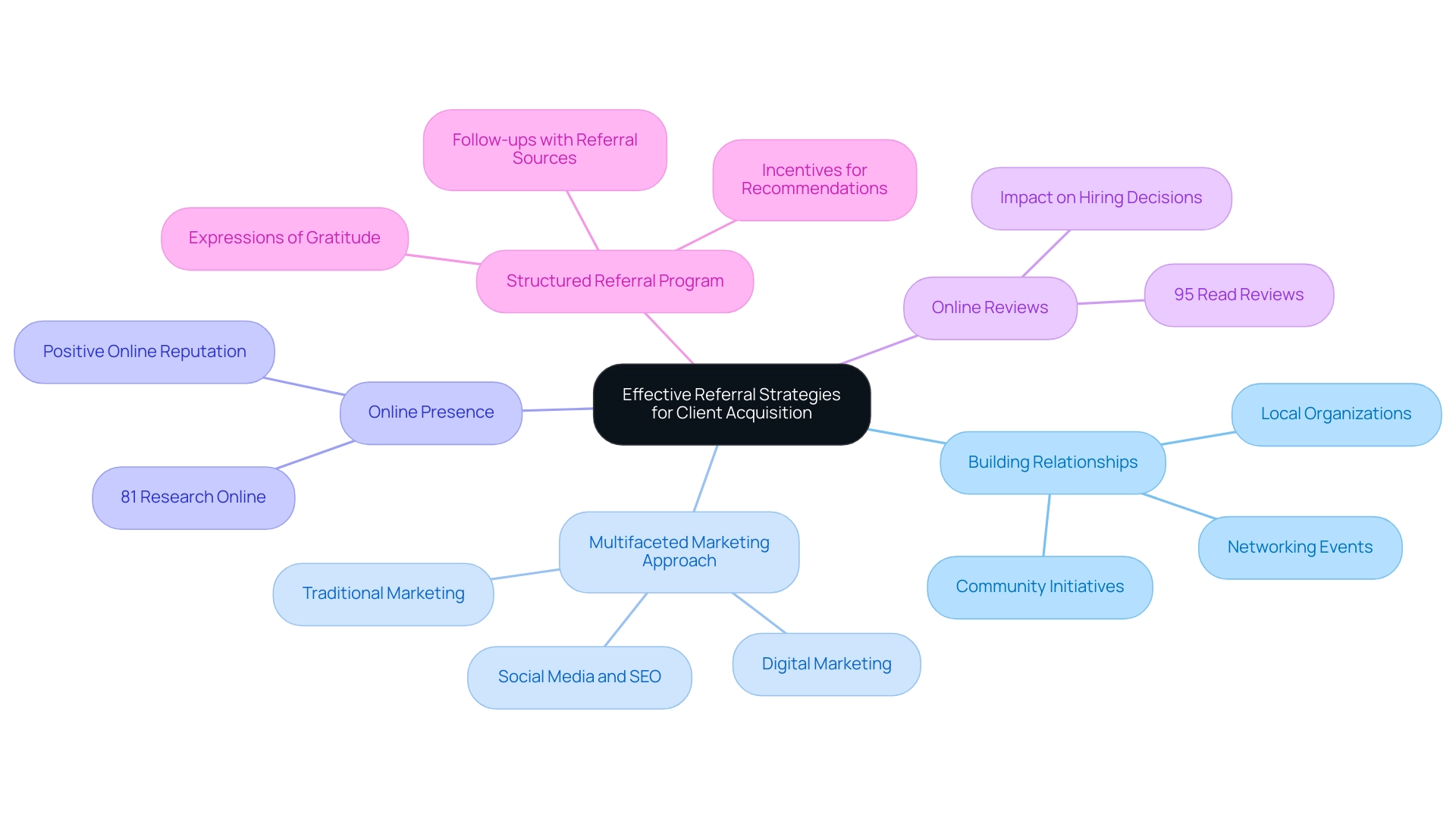
Conclusion
Implementing effective marketing strategies is crucial for family lawyers aiming to thrive in a competitive environment. By harnessing the power of content marketing, practitioners can create valuable resources that address common legal challenges, thereby establishing their expertise and enhancing visibility. Engaging actively on social media platforms further allows lawyers to connect with potential clients and build trust within their communities.
Optimizing SEO strategies is another essential component, as it significantly improves online visibility and attracts targeted traffic to law firm websites. By conducting thorough keyword research and maintaining a mobile-friendly online presence, family lawyers can ensure they reach clients effectively. Additionally, developing a strong personal brand that resonates with potential clients fosters deeper connections and enhances credibility.
Finally, cultivating referral strategies through networking with other professionals can create a sustainable flow of new clients. By prioritizing these multifaceted marketing approaches, family lawyers can not only enhance their practice’s growth but also establish a lasting presence in the legal community. Embracing these strategies will ultimately lead to increased visibility, client trust, and a robust client base, ensuring long-term success in an ever-evolving legal landscape.

